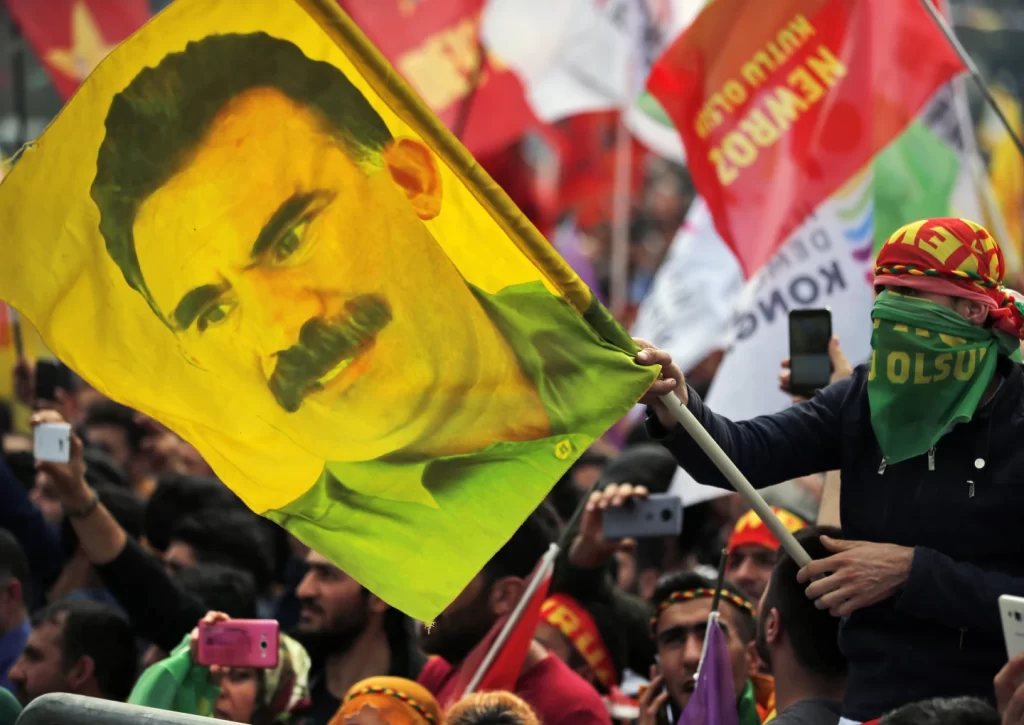
ISTANBUL — Imprisoned Kurdish leader Abdullah Ocalan called on his militant group Thursday to lay down its arms and dissolve as part of a new bid to end a four-decade long conflict with Turkey’s government that has claimed tens of thousands of lives.
In a message from his prison on an island off Istanbul, Ocalan said that the Kurdistan Workers’ Party, or PKK, should hold a congress and decide to disband.
“Convene your congress and make a decision. All groups must lay their arms and the PKK must dissolve itself,” Ocalan said, according to a message that was read in Kurdish and Turkish by pro-Kurdish party politicians who visited Ocalan earlier in the day.
Ocalan’s momentous announcement is part of a new effort for peace between the group and the Turkish state, which was initiated in October by President Recep Tayyip Erdogan’s coalition partner, Devlet Bahceli. The far-right politician suggested that Ocalan could be granted parole if his group renounces violence and disbands.
Ocalan, 75, has been imprisoned on the island of Imrali, off Istanbul, since 1999, after being convicted of treason. Despite his incarceration, he continues to wield significant influence over the PKK. The group’s leadership is widely expected to heed any call Ocalan makes, although some factions within the group could resist, analysts say.
Call for greater democracy in Turkey
The peace effort comes at a time when Erdogan may need support from the DEM party in parliament to enact a new constitution that could allow him to stay in power.
The Turkish Constitution doesn’t allow Erdogan, who has been in power since 2003 as prime minister and later as president, to run for office again unless an early election is called — something that would also require the support of the pro-Kurdish party.
The DEM party has long pressed for greater democracy in Turkey, rights for the country’s Kurdish population and to improve conditions for the imprisoned Ocalan.
Turkish officials haven’t said what Kurdish groups may have been promised as part of the peace effort.
There was no immediate reaction from the PKK’s leadership, which is based in northern Iraq.
The group, founded by Ocalan in 1978, has led an insurgency in Turkey’s southeast since 1984. The PKK is considered a terrorist organization by Turkey and its Western allies. Previous peace efforts have ended with failure — the most recent time in 2015.
Crackdown on the opposition
In the predominantly Kurdish cities of Diyarbakir and Van in southeast Turkey, people gathered in public spaces, dancing in anticipation of the announcement. They had hoped to watch it on large screens, but authorities permitted only a voice recording to be broadcast.
In his message, Ocalan highlighted the reasons behind the PKK’s armed struggle, including the state’s refusal to recognize a Kurdish identity. The statement went on to suggest that there was no longer any reason for armed conflict.
“There is no alternative to democracy in the pursuit and realization of a political system. Democratic consensus is the fundamental way,” Ocalan said in his message.
A photograph of Ocalan surrounded by the pro-Kurdish party officials and other inmates was displayed as the message was being read.
Efkan Ala, a deputy chairman of Erdogan’s governing party, who was involved in previous peace efforts, said that the group should heed Ocalan’s call.
“If the terrorist organization evaluates this call, lays down its arms and gathers to dissolve itself, Turkey will be freed from its shackles,” the state-run Anadolu Agency quoted Ala as saying.
In Iraq, Hoshyar Zebari, an Iraqi-Kurdish politician who served as foreign minister in the Iraqi government, described Ocalan’s statement as a “historic and powerful word.”
“Its timing was appropriate and it will have a positive impact in northeastern Syria, Iraqi Kurdistan and Turkey as well,” said Zebari, a senior official of the Kurdistan Democratic Party, which has maintained good relations with Turkey and has been at odds with the PKK.
In northeastern Syria, hundreds of people took to the streets to celebrate. Kurds in the region hope that an end to the PKK-Turkey conflict will also mean the end of the conflict between the Kurdish-led Syrian Democratic Forces, or SDF, and Turkish-backed groups in Syria.




